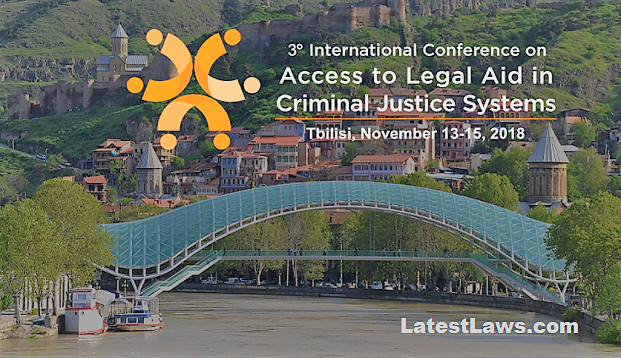November 16, 2018:
The conference was held in Tbilisi, Georgia at the Biltmore Hotel Tbilisi, located at 29, Rustaveli Avenue, Tbilisi 0108, Georgia.
The Third International Conference on Access to Legal Aid in Criminal Justice Systems (ILAC) was held in Tbilisi, Georgia from November 13 – 15, 2018 with the goal to address global challenges in ensuring access to quality legal aid services for the poor and vulnerable, particularly in criminal justice systems.
This three-day event was the third biennial global conference of its kind, following the inaugural conference held in Johannesburg, South Africa in June 2014, and the second conference held in Buenos Aires, Argentina in November 2016.
There were more than 300 participants from 65 Countries world over.
This Conference highlighted global efforts to implement the United Nations Principles and Guidelines on Access to Legal Aid in Criminal Justice Systems, which provide that States should put in place a comprehensive legal aid system that is accessible and effective, has a nationwide reach and is available to all without discrimination.
The Parliament of Georgia and the Legal Aid Service of Georgia, together with The International Legal Foundation (ILF), the Open Society Justice Initiative (OSJI), the United Nations Development Programme (UNDP), and the United Nations Office on Drugs and Crime (UNODC), and in collaboration with the Open Society Georgia Foundation (OSGF), the United States Agency for International Development (USAID) Project “Promoting Rule of Law in Georgia” implemented by East-West Management Institute (EWMI-PROLoG), the European Union (EU), the Council of Europe (CoE) “Support to the Judicial Reform” Project, and the United Nations Children’s Fund (UNICEF) hosted the International Conference on Access to Legal Aid in Criminal Justice Systems (ILAC).
The agenda of the Event was to encourage productive dialogue, discussion of good practices, and action-oriented outcomes, the conference was divided into two types of sessions:
(1) expert panel discussions, which was presented to the entire plenary or to 3 groups as parallel sessions, depending on the topic, and featured a broad range of speakers with diverse expertise and experience, and was complemented by question and answer sessions from the audience; and
(2) breakout sessions that enabled participants to break into 6 smaller groups to discuss topics addressed during panel sessions, ask questions, and brainstorm ways to implement reforms in their unique country contexts.
Participants were encouraged to develop concrete, action-oriented plans to address challenges related to the provision of legal aid to poor and vulnerable persons in their individual countries, and propose follow-up events at local, regional, or international levels.
Materials was distributed at the conference to help inform and guide discussions. To promote inclusiveness and active participation, multi-language translation services were provided for as many sessions as possible.
Objectives and Outcomes of the Conference By engaging national-level representatives, legal aid providers, civil society members, and other experts on common challenges to providing the poor and vulnerable with access to effective criminal legal aid services, and showcasing good practices and innovative solutions to common challenges this conference focused on practical and achievable outcomes.
The conference built on the presentations and discussions from the first two conferences, and highlighted global, regional and national efforts to strengthen access to legal aid in recent years.
Throughout the conference participants were encouraged to develop concrete, action-oriented plans to address challenges related to the provision of legal aid services and advance implementation of the UN Principles and Guidelines.
Participants were encouraged to consider how additional frameworks and initiatives can integrate with that goal, such as the 2030 Agenda for Sustainable Development with its principles of leaving no one behind, and reaching the furthest behind first, and specifically Goal 16, target 3 on rule of law and access to justice for all, the most recent General Assembly Resolution on Sustaining Peace, the Open Government Partnership’s National Action Plans, the International Legal Aid Network, and similar platforms and networks.
At the conclusion of the conference, participants had the opportunity to adopt a declaration in which they committed to take action on items related to improving access to legal aid at the domestic level, and cooperation and collaboration at the regional and international levels.
From India the Conference had participation of Mr. Surinder S Rathi, Director, National Legal Services Authority (NALSA).
Ms. Madhurima Dhanuka and Mr. Raja Bagga of CHRI India also participated in the event.
Picture Source :

























